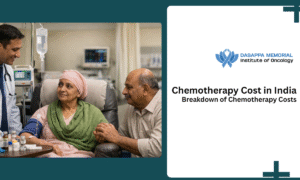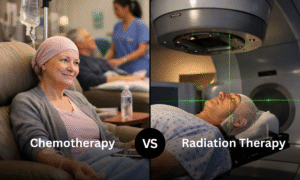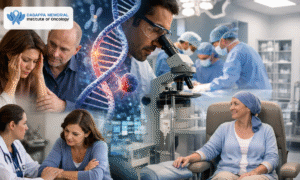Cancer myths vs facts often get mixed up in conversations, leading to confusion, unnecessary fear, and sometimes harmful decisions. While science has given us deeper insights into cancer cells, their growth, and how treatments work, many people still rely on outdated or false information.
As doctors and caregivers, we see how these myths affect patients emotionally and physically. The truth is, separating cancer myths from real facts can empower you to make better health decisions, follow evidence-based treatments, and support your loved ones with clarity.
In this blog, we will uncover the most common myths about cancer, explain the real science behind them, and share practical insights about cancer stages, diet for cancer patients, and treatment options. Stay with us till the end, because this discussion may change the way you think about cancer and give you a stronger foundation to fight it.
Why Do Cancer Myths Spread So Easily?
One reason myths spread so fast is that cancer is complex and frightening. People often turn to quick explanations or “miracle cures” that sound comforting. Social media and word-of-mouth further add to the confusion.
But here’s the fact: cancer is not a single disease. It includes more than 100 types, from cancers of the blood to those affecting organs like the lungs, liver, and breast. This variety makes it even more important to rely on accurate information rather than myths.
Common Cancer Myths vs Facts
Let’s look at the most common cancer myths and uncover the facts that science tells us.
| Cancer Myth | Fact (Science Says) |
| Cancer always means a death sentence | Many cancers are treatable, especially when detected early. Survival rates are improving due to advanced cancer treatment. |
| Surgery makes cancer spread faster. | This is false. Surgery removes cancerous tissue. Spread happens when cancer cells travel through the blood or lymph, not because of surgery. |
| Only lumps mean cancer. | Not true. Cancer can show in different ways: fatigue, weight loss, persistent cough, or cancer lymph nodes in the neck. |
| Eating sugar feeds cancer. | While sugar affects overall health, cancer cells do not grow only because of sugar. Diet balance is what truly matters. |
| Cancer is contagious | You cannot “catch” cancer from someone. It develops due to genetic changes and environmental factors. |
| Cancer only happens in older people. | While age increases risk, young adults and even children can develop cancer. |
Myth 1: Cancer Always Means the End

Fact: Many people believe that once diagnosed, cancer has no cure. This is no longer true. With advances in early detection and targeted therapies, survival rates are improving across cancer stages. For example, when cancer is detected before it spreads to distant organs, the chances of successful treatment are much higher.
Myth 2: If It’s Not Painful, It’s Not Cancer
Fact: Not all cancers cause pain in the beginning. Some cancers, such as those in the lungs or stomach, may progress quietly before showing symptoms. Swollen cancer lymph nodes in the neck may be painless but can indicate an underlying problem. This is why regular check-ups and early screenings are crucial.
Myth 3: Surgery or Biopsy Causes Cancer to Spread
Fact: This is one of the most harmful myths. Cancer spread happens when cancer cells move into the bloodstream or lymphatic system. Surgery or biopsy helps in diagnosis and treatment; it does not cause the disease to spread. Delaying surgery due to fear may actually worsen outcomes.
Myth 4: A Special “Cancer Patients’ Diet” Alone Can Cure Cancer
Fact: While a healthy diet supports treatment and recovery, it cannot cure cancer by itself. Cancer patients’ diet should focus on balanced nutrition, adequate protein, vitamins, and hydration to keep the body strong during cancer treatment. For example:
| Recommended Foods | Why It Helps |
| Fresh fruits & vegetables | Rich in antioxidants, supports immunity |
| Whole grains | Provides energy and improves digestion |
| Lean proteins (fish, eggs, legumes) | Helps repair tissues during treatment |
| Adequate fluids | Prevents dehydration and supports metabolism |
Tip: Always consult your oncologist or dietician before making major changes to your diet.
Myth 5: Cancer Has Only One Stage
Fact: Cancer stages describe how far the disease has progressed. There are generally four main stages:
- Stage I: Cancer is small and localized.
- Stage II: Larger tumor but still limited.
- Stage III: Cancer has spread to nearby tissues or lymph nodes.
- Stage IV: Cancer has spread to distant organs.
Understanding stages helps doctors plan treatment, from surgery to chemotherapy, radiation, or targeted therapies.
Myth 6: Natural or Herbal Remedies Can Replace Treatment
Fact: While some herbal remedies may support wellbeing, relying on them alone is dangerous. Cancer treatment requires scientifically proven methods like surgery, chemotherapy, immunotherapy, or radiation. Skipping treatment in favor of untested remedies may allow cancer cells to grow unchecked.
Myth 7: Cancer is Always Genetic
Fact: Genetics plays a role, but lifestyle and environment are also major factors. Smoking, pollution, alcohol, poor diet, and lack of physical activity can all increase cancer risks. Even if there’s a family history, adopting healthy habits can significantly reduce risk.
Early Detection: The Key to Fighting Cancer Myths
The most important fact to remember is this: early detection saves lives. Many myths exist because cancers are often diagnosed late, when treatment becomes harder. Recognizing symptoms, like persistent cough, unexplained weight loss, fatigue, or skin changes, can lead to timely diagnosis.
Example: A patient who noticed painless swelling in the neck (cancer lymph nodes in the neck) sought medical advice early. Diagnosis at Stage II allowed successful treatment, highlighting how attention to small signs can change outcomes.
FAQs on Cancer Myths vs Facts
Q1. Can cancer spread from one person to another?
Cancer cannot spread like the flu or an infection. It develops from genetic mutations that make cells grow uncontrollably. However, certain viruses and bacteria, such as HPV or Hepatitis B, can increase the risk of cancers like cervical or liver cancer. That’s why vaccines and safe practices are important for prevention.
Q2. Do all cancers require chemotherapy?
Not every cancer patient needs chemotherapy. Treatment depends on factors like the cancer type, stage, and overall health of the patient. While some cancers respond best to chemo, others may be treated with surgery, radiation, immunotherapy, or targeted therapies. Doctors often recommend a combination of approaches for the best outcome.
Q3. Is a lump in the neck always cancer?
A lump in the neck doesn’t always mean cancer. Many are caused by swollen lymph nodes due to infections like colds or throat issues. However, cancer lymph nodes in the neck are usually firm, painless, and persistent. If a lump lasts more than two weeks or keeps growing, it’s important to get it examined by a doctor.
Q4. Does stress cause cancer?
Stress alone does not directly cause cancer. But chronic stress can weaken the immune system, increase inflammation, and lead to habits like smoking, drinking, or overeating, which raise cancer risks. For cancer patients, high stress can also make recovery harder. Relaxation techniques, exercise, and mental health support can improve overall well-being.
Q5. Can diet prevent cancer?
There is no single cancer-proof diet, but healthy eating can significantly reduce risk. Diets rich in fruits, vegetables, whole grains, and lean proteins strengthen the immune system. On the other hand, processed foods, red meat, and excess sugar may increase cancer risk. For cancer patients, diet plays a major role in boosting strength, improving recovery, and reducing side effects of treatment.
Tips to Bust Cancer Myths in Daily Life
- Always check health information from credible sources (hospitals, research centres, oncologists).
- Be cautious of “miracle cures” promoted online without scientific backing.
- Encourage regular screenings for early detection.
- Support loved ones with facts, not fear.
Final Thoughts
Cancer myths vs facts are not just about knowledge; they are about life-saving decisions. Believing myths can delay diagnosis, disrupt treatment, or create unnecessary anxiety. By focusing on facts backed by science, we can approach cancer with clarity and confidence.
At Dasappa Memorial Institute of Oncology, recognized as the Best Cancer Hospital in Bangalore, we have seen how the right information, combined with timely cancer treatment, transforms outcomes. Together, let’s commit to breaking myths, spreading awareness, and standing strong in the fight against cancer.







